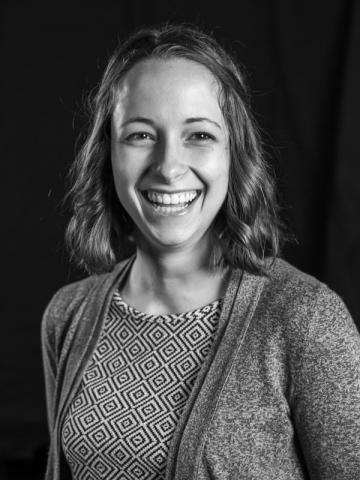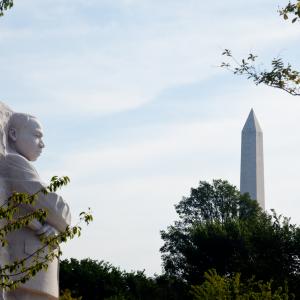
Charissa Laisy is the church engagement assistant at Sojourners and hails from Chicago, the greatest city in the world. She attended North Park University where she received a degree in sociology, as well as politics and government.
Before coming to Sojourners, she gained mobilizing experience in Chicago by organizing North Park students and the surrounding community in public actions against gun violence, mass incarceration, and for immigration reform. She is particularly interested in engaging with oppression on a systemic level, and she hopes to see an end to the prison industrial complex in her lifetime. She spends her “free” time thinking, reading, and writing about the intersection of politics with class, gender, and race.
Her claim to fame is that she once protested inside the Mortgage Bankers Association of America’s annual meeting dressed as Robin Hood. Her most deathly fears are cats, planes, and the color red. She enjoys continuous coffee consumption, hip hop, and all unhealthy food.
Posts By This Author
WATCH: Rev. William Barber II — Fusion Politics and the Future of Movements
Sojourners’ senior director of mobilizing Lisa Sharon Harper interviewed Rev. Dr. William Barber II on Jan. 21 about his new book, Forward Together, which chronicles the Moral Mondays movement in North Carolina. Rev. Barber tells the story of this “fusion” movement that brings together environmental activists, criminal justice reform advocates, minimum wage organizers, and others to further a comprehensive agenda for equality. Rev. Barber states:
“The people fighting public education are the same people fighting criminal justice reform. The same people fighting criminal justice reform are fighting voting rights. The same people fighting against voting rights are fighting LGBT rights and women rights, and the same people fighting those are fighting environmental rights. If the extremists are cynical enough to come together, we ought to be smart enough to come together.”
“Coming together” for progress may sound like a cliché call for bland unity. But Rev. Barber presents this as a shrewd strategy toward passing legislation and creating mass action. Watch the Google Hangout below/above to hear more of Rev. Barber’s reflections on movement building and sustaining. You can join the next Moral Monday march on Valentine’s Day, February 14, 2015 in Raleigh, NC. Click here for more details.
Why We Must #ReclaimMLK
In cities and towns across our nation, this weekend’s coordinated actions for the #BlackLivesMatter movement center on reclaiming Martin Luther King Jr.’s radical legacy. As you may recall, Missouri Gov. Jay Nixon and President Barack Obama — among others — invoked the nonviolence of King in their calls for peace following the non-indictment of Darren Wilson. As Martin Luther King Jr. Day approached, organizers had to field countless criticisms by white people telling them, “King wouldn’t approve of what you’re doing” and “I’ve studied his work, I know he wouldn’t react like you have.”
Based on comments like these, it stands to reason that white people in the United States may need a jolt of reality about King’s anti-capitalist agitation.
King was outspoken against capitalism’s oppressive clutch on both the national and global levels. King made it clear that racism and economics were intimately intertwined. I’m reminded of his classic quote, “What good is having the right to sit at a lunch counter if you can’t afford to buy a hamburger?”
King acknowledged that the discussion of class couldn’t be divorced from the discussion of race. While both conversations make us uncomfortable, somehow we would rather remember King as a civil rights leader only, and not also as a vocal critic of capitalism who instead favored a form of Democratic Socialism.
I often hear criticisms that protesters are disturbing the peace, employing overly aggressive tactics, and generally making people too uncomfortable. The hypocrisy in these claims is that King disturbed the peace, used aggressive tactics, and made people extremely uncomfortable. Why do we call for peace when what we mean is order?
I Am an Activist Do-Gooder in Recovery
I went to college thinking political activism was sexy. Living in a large city gave me unparalleled access to protests for countless good causes. Chanting at anti-war marches and getting arrested on behalf of climate change legislation would make interesting party stories, I thought. I quickly hopped on the Occupy Chicago bandwagon, a movement which calls for a more equitable wealth distribution, but whose leaders and participants were largely white college graduates. None of my organizing work focused on racial inequalities, but stayed in the realm of money in politics, equitable banking practices, and climate change.
My journey took a profound turn at an organizing training where I proudly stated I was there because my faith called me to advocate for the least of these. In response, a powerful, albeit brash, leader in Chicago’s movements angrily characterized me as an “activist do-gooder” who was fueled by the need to be a good white person. This label devastated me. I’m outspoken, passionate and willing to lead, I thought, so why can’t people see me as a resource? I took a break from the organizing world feeling disillusioned and miffed.
This attitude forced me to ask myself, why was I drawn to political activism in the first place? What was it that drew me to the movements in which I involved myself? And why was I so offended that someone had questioned my motives?
Second Chances: A Deeply Biblical Value
It’s no secret that the prison population in the United States has exploded in recent decades. We incarcerate our citizens at higher rates than any other developed nation. The federal prison population has increased by almost 790 percent since 1980. The number of children with one or more incarcerated parents has increased at an astonishing rate of 80 percent since 1991.
The mass incarceration of mostly Black and Latino men and women has moral implications in two ways. First, our current “tough-on-crime” approach to criminal justice has cost taxpayers a substantial amount with little effect on crime rates. These tax dollars could be spent instead on education, mental health, or drug rehabilitation. The way we spend public money reflects our public values. (Sound familiar?)
In addition, there are far-reaching moral implications of the act of naming someone “criminal." This label is inhumane, unjust, and unholy.
The “criminal” label has devastating effects on quality of life and equality of opportunity for many individuals. It is nearly impossible to shake. Most federal education grants are not available to someone with a criminal background. In many cities, access to subsidized or public housing is banned based on arrests or incarceration. Many states ban those with criminal backgrounds from food stamp eligibility. Being forced tocheck the box on an employment application indicating a past felony conviction essentially lands that application in the trash. The Sentencing Project estimates a total of 5.85 million people have been banned from voting because of a past conviction.
But Christians have a unique, biblically-based perspective on labels. In Christ, “sinners” become “beloved ones." The excluded, hated, and oppressed become included, wanted, and loved.


